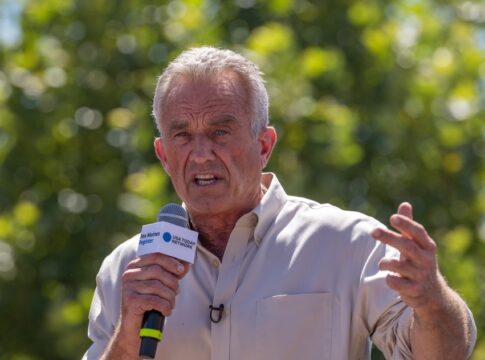US Health Secretary Robert F. Kennedy Jr.’s controversial plan to determine the cause of autism within five months has ignited fierce debate among scientists, medical experts, and advocacy groups about public health priorities and scientific realities. Autism rates have increased nearly fivefold since 2000, now affecting 1 in 31 U.S. children. Critics worry Kennedy’s environmental focus diverts attention from established scientific understanding.
Kennedy’s Controversial Autism Research Initiative
Health and Human Services Secretary Robert F. Kennedy Jr. recently unveiled plans for what he described as a “massive testing and research effort” to pinpoint the cause of autism within five months. Kennedy’s initiative, which he claims will “involve hundreds of scientists from around the world,” aims to identify environmental factors potentially linked to autism. The secretary’s ambitious timeline has raised eyebrows among experts, who question the feasibility of finding definitive answers to such a complex neurological condition in such a short timeframe.
Kennedy made bold assertions during his announcement, stating, “By September, we will know what has caused the autism epidemic, and we’ll be able to eliminate those exposures.” His investigation plans to examine a wide range of potential environmental contributors, including vaccines, food systems, water quality, air pollution, and even parenting methods. Kennedy has also appointed David Geier, a controversial figure and known vaccine skeptic, to assist with the research effort, further fueling concerns about the scientific credibility of the initiative.
🚨 RFK JR: “Autism destroys … our greatest resource, which are children. These are children who should not be suffering like this. These are kids who, many of them were fully functional and regressed because of some environmental exposure into autism when they're two years old.” pic.twitter.com/fHbXkZ4ON6
— Chief Nerd (@TheChiefNerd) April 16, 2025
Rising Autism Rates and Scientific Consensus
According to Centers for Disease Control and Prevention (CDC) data, autism diagnoses have steadily increased since 2000, with current rates showing approximately 1 in 31 U.S. children affected, up from 1 in 36 in 2020. While Kennedy has characterized this as an “epidemic” requiring urgent environmental investigation, many researchers attribute the rising numbers primarily to expanded diagnostic criteria, greater awareness, improved screening procedures, and changes in reporting practices rather than a true increase in incidence.
“The reasons for increases in autism diagnosis come down to scientific and health care progress,” said Annette Estes, a researcher
Scientific consensus views autism spectrum disorder (ASD) as a complex developmental condition with multiple contributing factors. Research consistently shows strong genetic components, with heritability estimates ranging from 50-90%. Environmental factors may play a role, but the relationship is nuanced rather than straightforward causation. The National Institutes of Health (NIH) already invests over $300 million annually in autism research, exploring various aspects of the condition through evidence-based approaches.
Colin Killick, executive director of the Autism Self Advocacy Network, discusses how Health and Human Services Sec. RFK Jr.'s comments about autistic people impact the community. pic.twitter.com/yDKrAVr2Md
— ABC News Live (@ABCNewsLive) April 16, 2025
Concerns From Advocacy Groups and Scientific Community
Kennedy’s approach has drawn sharp criticism from organizations dedicated to autism advocacy. The Autism Society of America expressed significant concerns about his characterization of autism and the proposed research methodology. In an official statement, the organization’s leadership questioned the transparency and scientific validity of Kennedy’s initiative.
Kennedy’s focus on environmental factors has been particularly controversial given his history of promoting debunked theories linking vaccines to autism. This discredited connection originated from a now-retracted 1998 paper by Andrew Wakefield, which has been thoroughly disproven by numerous subsequent studies. Scientific and medical authorities worry that Kennedy’s latest initiative may reinforce harmful misconceptions rather than advance legitimate understanding of autism’s complex nature.
Environmental Focus vs. Comprehensive Approach
While environmental research remains a valid component of autism studies, critics argue that Kennedy’s singular focus on external toxins misrepresents current scientific understanding. In public statements, Kennedy has dismissed genetic factors, declaring, “Genes don’t cause epidemics. You need an environmental toxin,” as reported by the New York Times. Such statements run counter to the established scientific consensus about autism’s multifactorial nature.
“The Autism Society is deeply concerned about the lack of transparency surrounding this proposed research and looming September deadline —specifically regarding who is leading this research, what methodologies are being used, and whether it will meet established scientific standards,” stated Christopher Banks.
Advocates emphasize that effective public health policy must balance investigation of potential environmental influences with continued support for evidence-based interventions, services for affected individuals and families, and research into the complex interplay of genetic and neurological factors that contribute to autism spectrum disorders. The ongoing debate highlights the challenges of aligning scientific research with sound policymaking, particularly when addressing complex developmental conditions.


